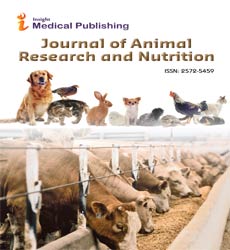Animal Feed: Providing Nutrition for the World's Animals
Vladimir Jackson*
Department of Animal Science, University of Kassel, Kassel, Germany
Published Date: 2023-08-07Vladimir Jackson*
Department of Animal Science, University of Kassel, Kassel, Germany
- *Corresponding Author:
- Vladimir Jackson
Department of Animal Science,
University of Kassel, Kassel,
Germany,
E-mail: Jackson_v@gmail.com
Received date: July 07, 2023, Manuscript No. IPJARN-23-17843; Editor assigned date: July 10, 2023, PreQC No. IPJARN-23-17843 (PQ); Reviewed date: July 24, 2023, QC No. IPJARN-23-17843; Revised date: July 31, 2023, Manuscript No. IPJARN-23-17843 (R); Published date: August 07, 2023, DOI: 10.36648/2572-5459.8.4.095
Citation: Jackson V (2023) Animal Feed: Providing Nutrition for the World's Animals. J Anim Res Nutr Vol.8 No.4: 095
Description
Animal feed is an essential component of modern agriculture, playing a pivotal role in ensuring the health and productivity of livestock around the world. As the global population continues to grow, so does the demand for animal-derived products, such as meat, dairy and eggs. This increased demand has placed greater importance on producing high-quality animal feed to support healthy and efficient livestock production. In this comprehensive exploration, we will delve into the world of animal feed, examining its types, ingredients, manufacturing processes and the environmental and economic implications of this critical agricultural input.
The Importance of Animal Feed
Livestock, whether poultry, swine, cattle, or aquaculture species, have specific nutritional requirements that must be met to maintain health, promote growth and produce high-quality products. These requirements include essential nutrients like carbohydrates, proteins, fats, vitamins and minerals. Properly formulated animal feed ensures that these needs are met, leading to healthier and more productive animals.
Efficient livestock production is vital for meeting the world's growing demand for animal products. High-quality animal feed plays a crucial role in optimizing production efficiency. It helps animals convert feed into meat, milk, or eggs more effectively, reducing the cost per unit of output and minimizing resource wastage. The livestock sector is a significant contributor to the global economy. Animal agriculture provides livelihoods for millions of people worldwide and generates billions of dollars in revenue. The quality of animal feed directly impacts the profitability of livestock farming operations. Improvements in feed quality can lead to increased production, better product quality and enhanced economic returns. Sustainability is a growing concern in agriculture and animal feed is no exception. Properly formulated and balanced feed can help reduce the environmental footprint of livestock farming. By optimizing nutrient utilization and minimizing waste, sustainable animal feed contributes to more eco-friendly farming practices.
Animal feed comes in various forms to meet the specific needs of different livestock species and production systems. The key types of animal feed include: Compound feeds are complete and balanced mixtures of various ingredients designed to meet the nutritional requirements of specific livestock. They are the most common type of feed used in commercial livestock farming. Compound feeds are typically produced as pellets, crumbles, or textured feeds and can be tailored to different growth stages and production goals. Forage refers to plant materials, such as hay, silage and pasture that are fed to livestock. Forage provides fiber, which is essential for proper digestion in ruminant animals like cattle and sheep. Grazing on pasture is a natural and sustainable way to feed animals, but it can be supplemented with other feeds to meet nutritional requirements. Concentrates are feed ingredients with a high energy content, such as grains (corn, barley and wheat), oilseeds (soybeans, sunflower seeds) and by-products (distillers' grains, wheat bran). They are often used to supplement forage-based diets, providing the energy and protein needed for growth and production.
Supplements are specific nutrients or additives that are added to an animal's diet to address specific deficiencies or enhance performance. Examples include vitamin and mineral supplements, amino acids and probiotics. Specialty feeds are formulated for unique livestock situations, such as medicated feeds for disease prevention, organic feeds for certified organic farming, and feeds for niche markets like game birds or ornamental fish.
Key Ingredients in Animal Feed
Animal feed contains a wide range of ingredients, each serving a specific purpose in meeting the nutritional needs of livestock. These ingredients can be categorized into several groups: Many animal feeds are converted into pellets for ease of handling and feeding. Palletization involves compressing the feed mixture into small, uniform pellets using specialized equipment. Pellets are less susceptible to sorting and waste by animals, and they facilitate precise feeding. Throughout the manufacturing process, quality control measures are implemented to ensure the feed meets safety and nutritional standards. This includes regular testing for contaminants, nutrient levels and feed particle size. The finished feed is packaged in bags or bulk containers and distributed to farms, feed stores, or other end-users. Proper storage and transportation practices are crucial to maintaining feed quality during distribution.
Given the growing concerns about the environmental impact of livestock farming, there is a growing focus on sustainability in animal feed production. Sustainable feed production aims to reduce the negative environmental and social impacts of feed manufacturing while ensuring the nutritional needs of livestock are met.
Feed manufacturers are increasingly looking for sustainable sources of feed ingredients. This includes using certified sustainable palm oil, avoiding deforestation-linked soy and promoting responsible sourcing of seafood for fishmeal. Efforts are being made to reduce food waste in the supply chain, including diverting food by-products and surplus products away from landfills and into animal feed.
Improving the efficiency of nutrient utilization by animals can reduce the environmental footprint of livestock farming. This involves optimizing feed formulations and management practices. Research into alternative protein sources, such as insect meal and algae, is ongoing to reduce the reliance on traditional protein sources like soy and fishmeal.
Efforts to reduce the carbon footprint of animal feed production include adopting energy-efficient technologies and utilizing renewable energy sources. Animal feed is a linchpin of modern agriculture, underpinning the global production of meat, dairy, eggs and other animal-derived products. Its role in ensuring the health and productivity of livestock cannot be overstated. As the world's population continues to grow, the demand for animal products will increase, further highlighting the importance of producing high-quality, sustainable animal feed. To meet this challenge, the animal feed industry must continue to innovate, adopting sustainable practices, reducing waste and minimizing its environmental impact. As consumers become more conscious of the environmental and ethical aspects of their food choices, the need for sustainable and responsible animal feed production will only become more pronounced. It is through such efforts that the animal feed sector can contribute to a more sustainable and resilient global food system.

Open Access Journals
- Aquaculture & Veterinary Science
- Chemistry & Chemical Sciences
- Clinical Sciences
- Engineering
- General Science
- Genetics & Molecular Biology
- Health Care & Nursing
- Immunology & Microbiology
- Materials Science
- Mathematics & Physics
- Medical Sciences
- Neurology & Psychiatry
- Oncology & Cancer Science
- Pharmaceutical Sciences
